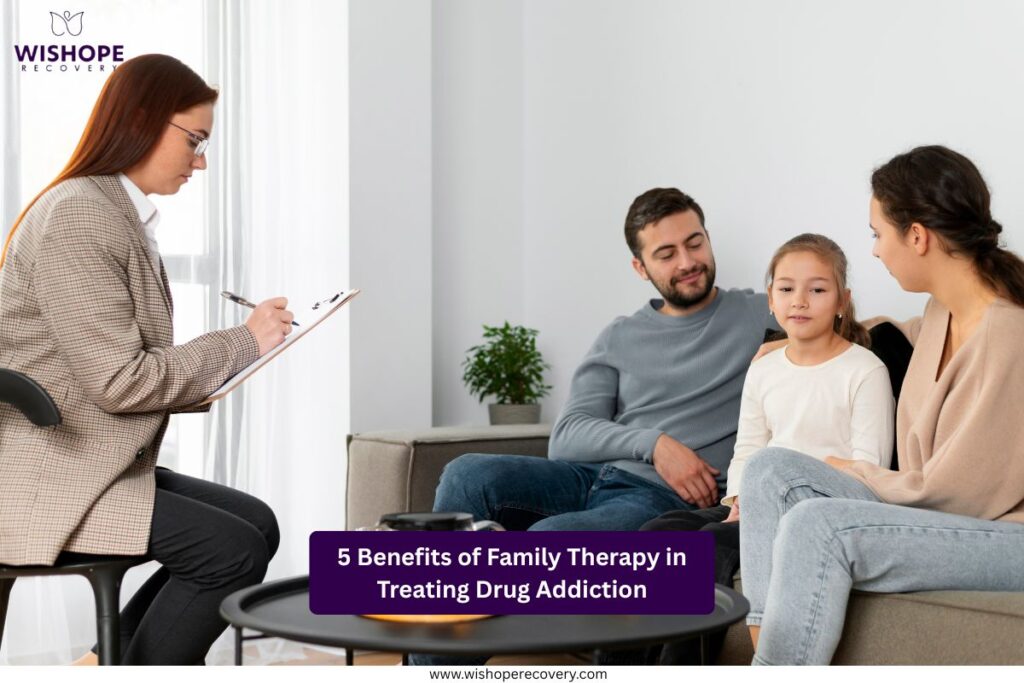According to information from past experience, an addiction has shattered every person within a radius of the individual. It not only destroys lives but also encompasses all relevant relationships. Most especially there, the family becomes silent sufferers of all these emotional hasps, maintained relationships, and the utter chaos an addicted child brings home. That is why therapy for the family has become very final in rehabilitation for one. It is no longer an option. The modern theories of treatment accept the fact that family involvement could lead to better treatment results of the addicted individual. From going through family therapy near me to hunting for a family counselling for adults, understanding the powerful role families can play in the recovery process is an excellent first step.
Here are five of the primary advantages of family therapy in addiction treatment. Out of these, most will affect not just the addicted individual but rather everyone around him or her.

1. Rebuilding Broken Communication
Communication becomes one of the greatest casualties of addiction. Substance use escalates, conversations become arguments, silence becomes a crutch, and trust disappears. Family members often stop expressing how they feel-either out of fear of igniting a conflict, or they feel it won’t make much difference anyway.
Family therapy in the realm of addiction treatment creates an environment in which all family members can be heard. With a licensed therapist leading the way, the members express emotions, set boundaries, and begin to rebuild connections. Families can talk freely with each other without blame or shame.
By now, improving communication serves as a precursor for healing while processing emotions, during and after recovery.
2. Breaking the Cycle of Enabling and Codependency
Families of individuals affected by substance use disorder develop unhealthy behaviours mostly unknowingly: enabling or codependency. This could manifest as covering for the addict, giving money, or sacrificing personal well being for the sake of peace.
Family therapy for drug addiction will prepare family members to acknowledge patterns of behavior and effect change. Family members learn to support responsible recovery rather than enablement. Therapy also allows family members to address their own mental health-needs, which tend to be thrown on the back burner amid struggles with addiction.
Thus, breaking these cycles is important for the recovering individual while preparing the family for health in the long term.
3. Establishing a Reliable Support System:
Isolation is one of the crushing realities of addiction recovery. There is a sense of shame, judgment, or simply feeling misunderstood. Involvement of the family in therapy reinforces the idea that the person in recovery is not alone.
Family therapy for addiction creates a strong emotionally supportive environment. Such support is among the most potent protective factors against relapse. When someone knows their family members are involved in their recovery, it brings in greater impetus and accountability.
If you are searching for family therapy near me, many rehabilitation centres and private practices offer integrated programming that invites and encourages family participation.

4. Addressing Underlying Family Issues:
Addiction does not happen solely within the individual. Many times unresolved trauma, dysfunctional family dynamics, or long-term emotional wounds contribute to addiction or escalate already present substance abuse. Such places offer possibilities for touching on these deeper issues.
Family therapy is the venue where an adult, and his or her family member may work through healing from past hurts to building trust and learning how best to create healthier more connected relationships. This may entail looking at generational patterns, parenting styles, and various relational issues that have been unaddressed for years.
Through this therapy, true healing, not just cure of symptoms, is promoted while preventing the breakdown of future relationships by getting into root causes.
5. Enhancing Recovery Outcomes for the Long Term:
Addiction treatment outcomes are considerably more robust when families are included. So according to several studies, people recovering from addiction who go through family therapy for that particular treatment are likely to be more successful in their treatment completion, sticking with sobriety, and reconstructing a sound relationship.
Why? Because recovering is not a one-person affair. A family learns that an other person supports their open dialogue and commitment to their own healing, becomes a source of strength. That’s the actual advantage: growing together.
Well, it shows that you’re there for them-of big usage here as a parent, sibling, spouse, or adult child because that matters in therapy because it shows the loved one that this recovery is not just a one-person mission-it’s a family journey.
Final Thoughts:
Addiction itself is indeed an intricate and agonising experience; but recovery is possible, especially when involving the loved ones by the sufferer’s side. Family therapy in addiction treatment has proven to be one of the most powerful healing modalities for drug addiction, not just for the actual drug user but for the family as a whole.
If you feel ready to start getting some help, check out family therapy near you or consider asking your treatment provider for adult family counselling programs. Healing the family as soon as possible serves as a greater foundation for lifelong recovery.
Because families that heal together tend to remain strong together.

